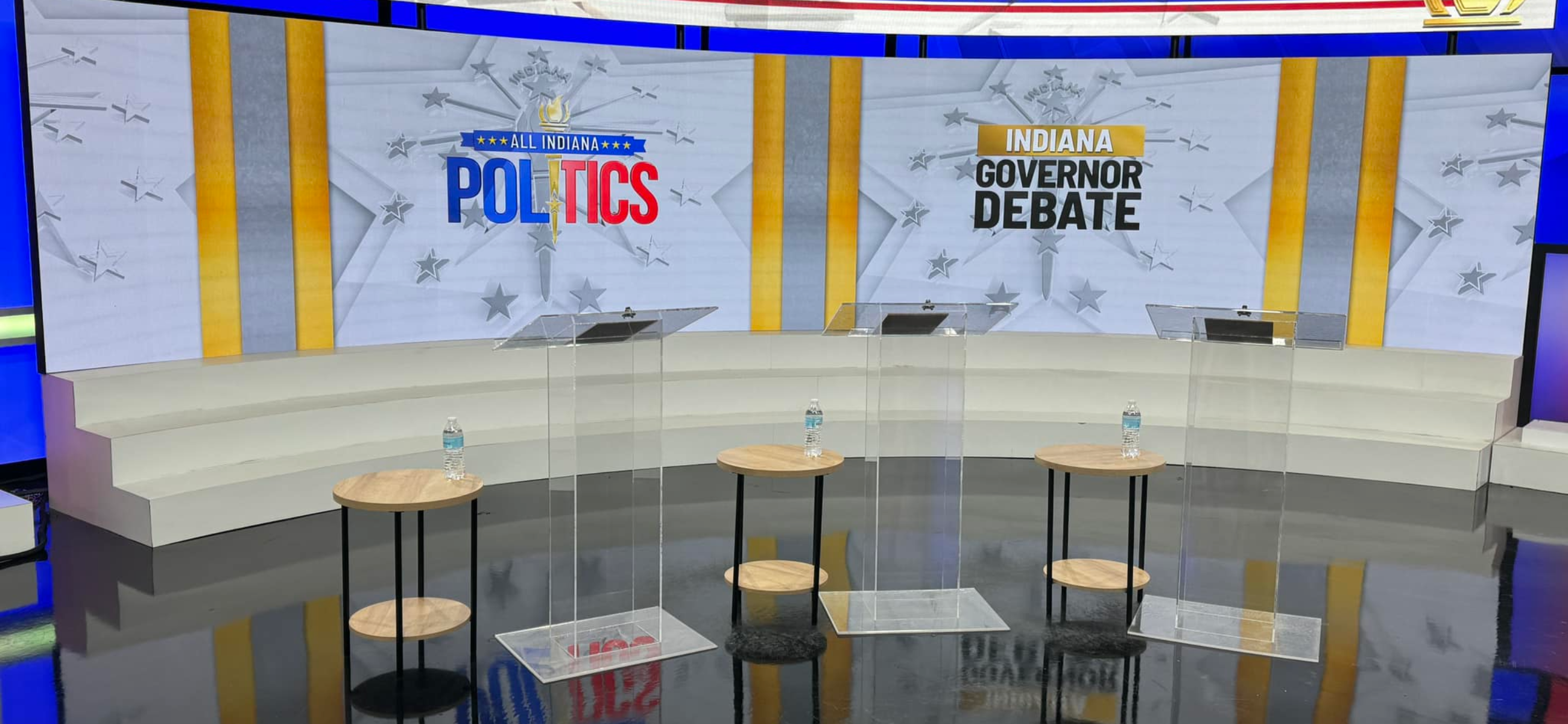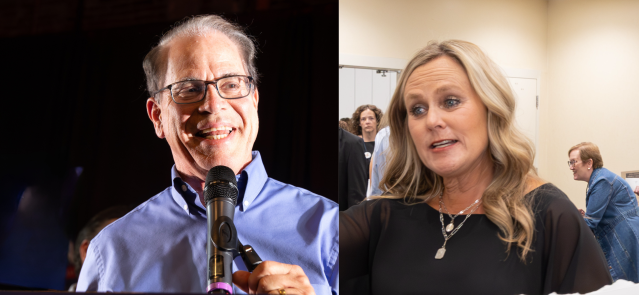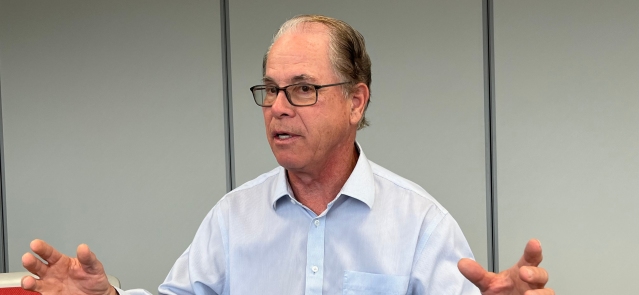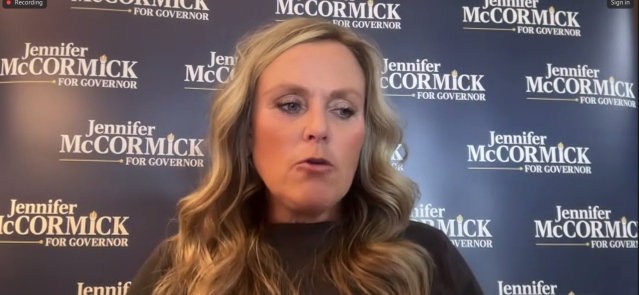Stay ahead of the curve as a political insider with deep policy analysis, daily briefings and policy-shaping tools.
Request a Demo
The debate stage is set for the gubernatorial candidates on Oct. 3, 2024. (Credit: WISH-TV)
- The three candidates for Indiana governor debated one another
- Property taxes dominated much of the conversation
- Immigration, marijuana and education were also discussed
Keeping tight to the topics at hand and rarely calling one another out, the three candidates vying to be Indiana’s next governor stuck mainly to the script as they met on the debate stage Thursday.
The debate, hosted by WISH-TV in Indianapolis and moderated by WISH anchors Phil Sanchez and Dakarai Turner, was the second faceoff in as many days. However, it was the first to include Libertarian candidate Donald Rainwater, who was joined by Republican U.S. Sen. Mike Braun and Democratic former Superintendent of Public Instruction Jennifer McCormick.
Here are five key takeaways from the political contest.
Property taxes still loom large
The debate’s first question revolved around property taxes, which all three candidates agreed must be lowered.
Braun leaned into his proposed plan, which he said would cap property tax increases at 3% each year and reset the overall tax to 2021 levels.
McCormick said her plan, which would involve income tax credits, would do less damage to the local governments and school districts who rely on property tax income.
Rainwater said he would transform property tax into a 1% sales tax on the purchase of any home.
During a rebuttal period, McCormick pressed Braun on the impact his plan would have on municipalities.
“Local governments and school districts are the lifeblood of government in the state … but they have got to live within the means of the taxpayer,” Braun said.
“Your property taxes are your money,” Rainwater said. “Local governments and state governments are addicted to spending your money.”
Braun attacked on immigration
Rainwater and McCormick went after Braun on immigration, contending that the first-term senator has not addressed illegal immigration in his six years in office.
“If the man has been a U.S. senator for the last six years, why hasn’t he solved it?” Rainwater asked.
McCormick referenced a bipartisan Senate bill that would have provided more than $118 billion to support border protection and legal immigration, which Braun voted against.
“The perception in Indiana is he voted no for political reasons versus the safety of Hoosiers and the safety of Americans,” McCormick said.
Braun said the bill would have allowed up to 5,000 illegal immigrants into the country per day. He then blamed President Joe Biden and Vice President Kamala Harris for the problems at the U.S.-Mexico border.
“It was open borders, and the consequences of that have been chaos and making every state a border state,” Braun said.
Braun takes shots at McCormick’s superintendency
The topic of school vouchers devolved into a referendum on McCormick’s time as head of the state’s school system.
“If you were in charge for four years and [test] results never got any better, I think you’ve got to be held accountable when that’s the one thing you did in state government,” Braun said.
McCormick responded that she was only in charge of implementing policy, not making it.
“I wasn’t the one responsible for changing state law to make us keep changing standards and assessments,” she said. “That’s on the 20 years of Republicans leading our state.”
Rainwater and Braun support private school vouchers for all Indiana families, while McCormick said the system lacks proper financial oversight.
“We are a state that has been on the leading edge of choice and competition and putting the parent as the main stakeholder in his or her kid’s education,” Braun said of Indiana’s voucher program.
Some agreement on the future of marijuana
The candidates agreed the state needs to reassess its all-out marijuana ban, although not necessarily on how to approach it.
McCormick said 80% of Hoosiers support some form of legalization. She called for allowing medical marijuana and creating a study committee to examine recreational use.
“We’re leaving $177 million on the table,” she said of the possible tax revenues.
Rainwater called for full legalization, pointing out that the state has already regulated tobacco, alcohol and prescription drugs. He also said he would expunge the records of anyone convicted of a nonviolent, marijuana-related crime.
Braun expressed interest in discussing medical marijuana legalization but said it would have to be done so with law enforcement buy-in.
“I think the time is right that we look at it seriously,” he said.
Cuts coming for state agencies?
All three candidates called for shrinking the state government, and the moderators asked how each would do so.
Braun said he would lean into his business background, having run a successful trucking parts company for decades. He theorized he could trim up to 5% of the state’s $22 billion budget just by combing through state agencies for inefficiencies.
“If you’ve had a record of growing a business and keeping costs under control, it should be even easier in government,” he said.
McCormick, who ran one of the state’s largest agencies as school superintendent, said she had already done the work of adjusting both lean and heavy staffing areas, as well as cutting programs that didn’t result in strong enough outcomes.
Rainwater said managing state contracts and business practices could produce savings.
How to vote
- Oct. 7 is the last day to register to vote.
- Early voting begins Oct. 8 and ends at noon Nov. 4.
- Polls will be open from 6 a.m. to 6 p.m. local time Nov. 5.
- Find your polling place using the state voter website.
- For more information, check out State Affairs’ voter guide.
Contact Rory Appleton on X at @roryehappleton or email him at [email protected].
Read this related story:
Braun, McCormick spar over ads, abortion
Know the most important news affecting Indiana
Get our free weekly newsletter that covers government, policy and politics that impact your everyday life—in 5 minutes or less.
Here’s how to watch this week’s Indiana gubernatorial debates
The Gist The candidates striving to be Indiana’s next governor will meet on the debate stage several times this week, offering voters a key glimpse into the nominees’ personalities and platforms. Two fellow Midwesterners will also meet for the first time on a national stage when Ohio Sen. JD Vance, a Republican, and Minnesota Gov. …
The COLA for your Social Security
INDIANAPOLIS — You’ll soon hear about the cost-of-living adjustment, or COLA, to the monthly retirement benefit paid by Social Security. That benefit won’t show up until January 2025, but there will be enough time to grouse about it. Pappy Pickel is reading his newspaper to his niece Paula: “According to the information to be had …
Braun wants to push Legislature further on health care steps
Proposals from Republican gubernatorial candidate Mike Braun for addressing Indiana’s health care costs and improving access would push the Legislature to go further in some areas where it has been reluctant to do so. Braun’s proposals released Thursday argue that Indiana’s business environment is hurt by high health care costs that discourage investment. Braun called …
McCormick’s economic plan: Fewer tax breaks, greater focus on worker retention
Democratic gubernatorial nominee Jennifer McCormick proposed a retooling of the state’s budget and economic development strategy to prioritize individual Hoosiers’ needs — child care, education, health care, better maintained cities and an expanded earned income tax credit — as part of a business and economic platform rolled out Thursday morning. “Our approach is balancing that …




